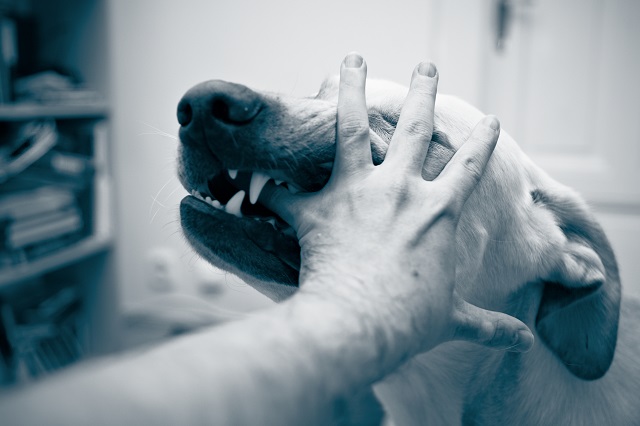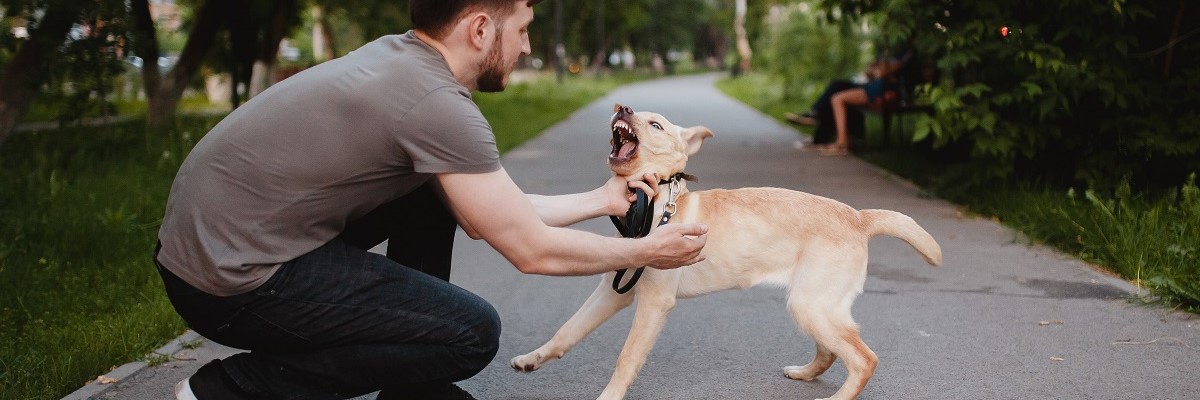How do you stop a Labrador from biting?: Most of the time, when your Labrador bites people or other animals, it’s because they feel threatened or intimidated.
Dogs sometimes behave this way as a natural behavior. Because of this, it’s crucial for anyone dealing with a dog to consider what might cause them to be aggressive.
The owner of a Labrador that is known to bite should be held accountable for the dog’s behavior. However, it is important to keep in mind that children must also learn to keep themselves safe around these dogs.
The good news is that you can prevent your Lab from biting if you follow the right steps. Making sure that you manage your Labrador properly will help everyone stay safe.
Six Reasons Why Labradors Will Bite.
| Running away from your Lab after playing can also cause them to bite. Your Labrador may believe it’s part of the game, or trying to get away may cause herding behavior or prey behavior in them. | Labradors in traumatic situations may attack people who approach them. The situation is similar to being assaulted or abandoned on the roadside. Additionally, it could be anything you would consider as usual, such as a loud thunderclap. |
| Other causes include trauma and sickness. It may be uncomfortable for a Labrador to be touched and handled if they don’t feel well. | You can even make your Labrador bite if you suddenly wake it or approach from behind. |
| A Lab may be possessive of what it perceives to be its own -be it a toy, a meal, its territory, or even you. | Labradors bite if they need to defend themselves, their owners, or other members of the family. It is indisputable that a female Labrador will be extremely protective of her litter (puppies). |
The Warning Signs Before Your Labrador Will Bite
Knowing what causes your Labrador to bite will help you prevent these situations. Certain behavior patterns accompany the majority of dog bites. You can use them as a warning sign that you need to take measures to stop your Lab’s discomfort or anxiety.
It is common for their ears to be folded backward, the hair on their backs to stand up, and the whites of their eyes to be visible. The standoff reaction, such as freezing in reaction to a touch or a look accompanied by lowering the body, is also a possible signal from your Labrador.
How To Stop Your Labrador Biting
| Socialize your Lab as soon as possible. In relaxed, supportive surroundings, encourage your Labrador to meet and communicate with people of all kinds, including kids, disabled people, and the elderly. | Keep your Labrador on a leash or in a gated area. Know your Lab well before letting it go of its lead in the designated areas. Make sure you can see your Lab at times. |
| Physically, abusively, or forcefully punishing Labradors is never considered acceptable. Whenever you train your Lab, make sure you use positive reinforcement, praise, and treats instead of shock collars and loud noises. Suppose you regularly praise your Lab for good behavior. In that case, you are much more likely to see results, as your Labrador wants to please you and follow your commands. | It is important to expose labs to various situations, such as other pets, sudden noises, machines, motorcycles, or anything else that could make them fearful. Make sure you start training your Labrador as soon as possible and make your interactions pleasant. |
| If your Lab has a nervous or threatening inclination, please alert others. Don’t encourage your Lab to interact with people and other pets unless the environment is tightly monitored. | Know the signs that your Labrador is being aggressive. You may have to remove your Labrador before things get out of control when you cannot monitor his actions. |
| It is a good idea to have toys for your Lab when they are young so that when they begin biting or nipping, you can redirect their attention to the toy and reward them for doing so. |

My Labrador Bit Me Hard!
A hard bite from your dog is not only alarming but can also be surprising and frightening. As well as the physical discomfort caused by the bite, you are likely to experience a spectrum of emotions.
| Secure Your Lab |
|---|
| Secure your Labrador as soon as possible to prevent further problems. Lock them in a crate or place them in a different bedroom, or restrain them with a leash. Depending on the situation, your Lab may still show violent behavior, be frightened, or be concerned. You may also find that your Lab is still very concerned about the events that led them to bite. However, no matter the reason for your Lab’s bite, restraint will ensure that you, your family, and other animals remain safe. |
| Following the Dog Bite |
|---|
| The first step is to make sure your Lab is removed or put away sensibly, then examine the wound. In order to treat grazed skin, you will need to wash it with soap and warm water and apply a bandage. However, you should assume that you will need sutures or that you have not recently had a tetanus shot if the injury is substantial. Suppose your Labrador rabies vaccine isn’t current. In that case, you’ll need to go to a doctor’s office or an emergency medical center to get professional treatment. Your Labradors mouth is not sterile or bacteria-free. You may also be prescribed medications to prevent the infectious disease from forming. |
| Time For A Professional |
|---|
| Your Lab bites you hard enough to break the skin. You can consult with professional dog trainers to determine what made your Lab bite you. As well as overcoming and modifying the behavior that caused your Labrador to bite, they can also teach you how to handle it better. Some situations will call for the assistance of dog trainers, but not all. Your Labrador has bitten you more than once. You have no idea why they bit you. You have become afraid of your Lab. You have young kids within your household. You have become worried that they could bite again. |
My Labrador Bit Someone!
Many of the same things mentioned above are relevant here, so we will not repeat the same information. However, a few more things must be discussed.
When Outside Your Home
Keeping control of your Labrador is the first action you must take. Imagine that your Lab bites someone when you’re out walking. Whenever you’re in an awkward situation, it’s best to remain as rational as possible and support the individual. After they are under control, ensure that you provide the victim with your contact details and collect theirs. You should also collect the contact information of any witnesses.
Inside Your House
Move your Labrador to a crate or a bedroom if your Lab bites someone in your home. It may be necessary to seek medical help for the individual. Locate the closest emergency medical center or dial 911 for assistance. Provide first aid using gauze and antibacterial skin cleansers if your Lab bites someone at your house.
Potential Legal Issues
It is crucial to stay calm. Do everything you can to help and support the person who has been bitten, and document the event as much as possible. The individual still has a possibility of bringing a civil action against you.
As a general rule, owners are responsible for harm caused by their dogs, even if the trespasser was on your property at the time of the bite. Talk to a lawyer to determine the right course of action.
Taking care to ensure that your Labrador does not attack people is your responsibility as a responsible Lab owner. If you allow your Lab to run free on your property and it has been known to bite, make sure that it is well-trained (as mentioned earlier) and perhaps has some warning signs. Ensure you know how to manage your Labrador in the event that it bites.

